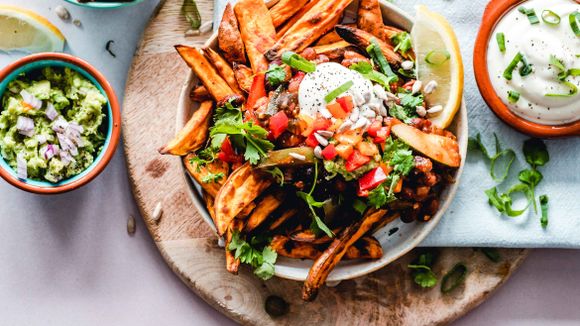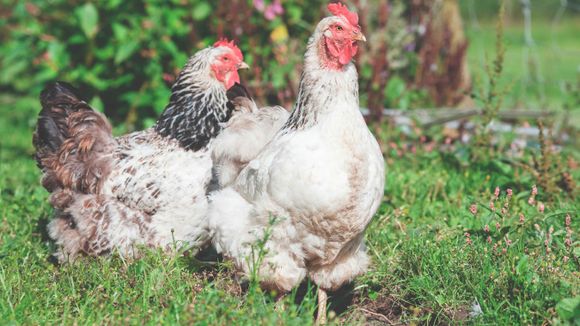Pros and cons of the plant diet
A sustainable vegan diet may be the best thing to protect the environment, combat climate change and a sustainable food system, according to some experts. It is found that a vegan diet is "the single most important thing" a person can do to reduce their impact on the planet. [ref. 1] This study, conducted by researchers from Oxford University, can motivate people to change their eating habits as long as it reaches them in an understandable way.
One of the main culprits of deforestation on the planet, for example, is palm oil, which is widely used in skincare products as well as in almost all sweet products. Also, the ever-growing global population has led to a significant increase in livestock production. Beef production has more than doubled since the 1960s, while chicken production has increased by a factor of nearly 10, according to the United Nations Food and Agriculture Organization (FAO). [Ref. 2]
The bodies of chickens, calves and pigs are larger than ever, thanks to breeding tactics, with their weight increasing by 20-30 percent over the past six decades. The production of cow's milk per animal has increased by 30 percent, as has the production of hen eggs. You can imagine that significant amounts of natural resources are needed to sustain these industries. Livestock farming is also a leading generator of greenhouse gas emissions, including methane and nitrous oxide.
While a plant-based diet is not the solution to every problem, it can certainly help with a lot of them. Whether you are concerned about your own health or that of the planet, switching to a plant-based diet is easier than ever. In fact, it can be quite tasty to eat only fruits, vegetables, legumes and raw foods. Below are six strategies to support the process of change if you decide that ethical and medical reasons are worth it.
6 easy ways to switch to a plant diet
Cooking time at home
Cooking with products at home is one of the best ways to enjoy delicious food with recognizable composition, thus saving carbon emissions in comparison with delivery from a restaurant. According to the season you could also enjoy seasonal fruits and vegetables rich in antioxidants, fiber and water. Protein can be provided from legumes, soybeans, tofu and other foods.
Educate yourself about the benefits
Education is essential to start any endeavor. Even vegetarianism has its pitfalls. For example, a fifth of all calories consumed by Americans come from nutrient-poor white flour. If you eat processed bread every day, you miss out on the benefits of the rich and varied diet you can provide with wholegrain bread, for example. And why not homemade bread with products you have chosen and prepared by yourself?
Many of the "diseases of wealth", such as cardiovascular disease and obesity-related diseases, come from poor diet (and lack of movement). Meat has been an essential component of the human diet throughout our evolution. Today we eat too much of it - and too much of it is produced on factory farms. Switching to a plant-based diet can help reduce carbon emissions and the aforementioned diseases.
Also, plants are rich in valuable phytochemicals and antioxidants that support a strong immune system. The plant diet has been shown to reduce the risk of diabetes, stroke and heart disease. [ref. 3] [ref. 4] These are all great reasons for switching to plant-based nutrition, aren't they?
Start your journey step by step
If you are interested in a plant-based diet, try to eat vegetables every other day for several weeks. Notice how your body reacts on days when you eat this way compared to other days. Gradually stop the consumption of meat products. Try meat-free weekdays and see if your desire for meat continues on the weekend. Try using meat as a side dish instead of a main course.
Start with foods you already love
The good news is that you probably have a number of plant-based dishes that you love. Switching to a new diet requires a certain level of pleasure. Otherwise, you will hate eating, and the food should bring satisfaction and still taste good to us. So make a list of favorite plant foods and put them in your menu at each meal.

Avoid ingredients you cannot pronounce
Surely the nearest grocery store provides almost everything you need to survive. You can probably pronounce any ingredient from the labels, but not every food has a good nutritional composition. Potato chips are technically vegetarian, but heat treatment is used to make them, alo and things with complex such as emulsifiers, thickeners, stabilizers make those foods extremely unhealthy. Therefore, if you do not know what these things mean, you better not buy the foods that contains them. In most cases, these are foods rich in carbohydrates or trans fats.
Take advantage of the wisdom of the internet, but keep a cool head
There are many terrible tips on the internet – and worse – a lot of propaganda. While you probably don't want to eat eggs every day, they are not "toxic," as some sources claim. Eggs are one of the best cheap foods with high value and an excellent nutritional profile. Note that eggs fit into the diet of flexitarians, which is a kind of flexible vegetarianism, in which milk and dairy products can be consumed.









